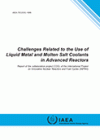Initially developed in the 1950s, molten salt reactors have benefits in higher efficiencies and lower waste generation. Some designs do not require solid fuel, which eliminates the need for manufacturing and disposing of it. In recent years, growing interest in this technology has led to renewed development activities.
Molten salt reactors
Molten salt reactors (MSRs) are seen in some countries as a promising advanced reactor technology because of the various benefits associated with them. They operate at higher temperatures, which lead to increased efficiencies in generating electricity. In addition, low operating pressures can reduce the risk of a large break and loss of coolant as a result of an accident, thereby enhancing the safety of the reactor.
MSRs also generate less high-level waste, and their design does not require solid fuel, eliminating the need for building and disposing of it. These reactors can adapt to a variety of nuclear fuel cycles (such as Uranium-Plutonium and Thorium-Uranium cycles), which allow for the extension of fuel resources. They can also be designed as nuclear waste “burners” or breeders. The high-temperature heat generated by MSRs can then be used for electricity generation and for other high-temperature process heat applications.
Development of MSR technology is on the increase in many countries. They work on a variety of reactor concepts, which can trace their origins to the Molten Salt Reactor Experiment embarked on by the Oak Ridge National Laboratories in the 1960s. Current research and development efforts are focused on resolving materials-related issues, assessing safety features, developing core design methods and evaluating economic models.
The IAEA fosters an international exchange of information on the advances in reactor technology, including for MSRs. It provides a forum for international collaboration on R&D activities and supports Member States by providing objective and reliable information and understanding of various reactor technologies and their non-electric applications.







